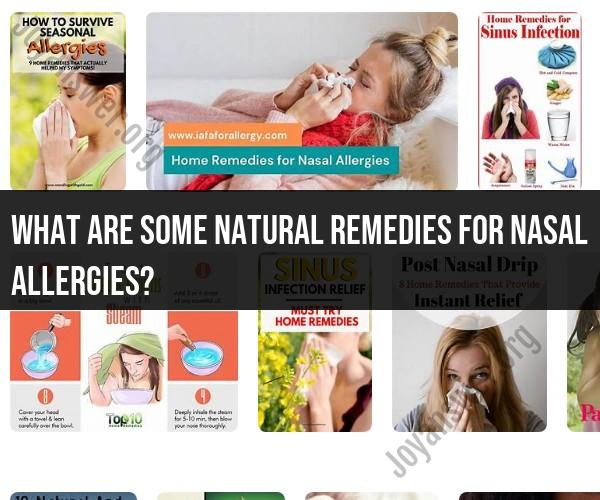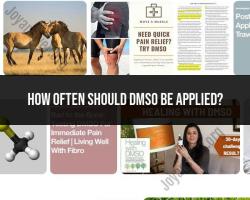What are some natural remedies for nasal allergies?
Natural remedies for nasal allergies, also known as allergic rhinitis or hay fever, can provide relief from symptoms without the use of medication. These remedies aim to reduce exposure to allergens and alleviate symptoms. Here are some effective natural remedies to consider:
Saline Nasal Irrigation:
- Saline nasal irrigation involves using a saline (saltwater) solution to rinse the nasal passages. This helps clear allergens, mucus, and irritants from the nasal passages, reducing congestion and symptoms.
- You can use a neti pot, nasal spray, or a saline nasal rinse kit to perform saline irrigation. Follow the instructions carefully.
Honey:
- Consuming locally sourced honey may help reduce allergic rhinitis symptoms, as it may contain trace amounts of pollen from local plants. Gradual exposure to these pollen allergens may desensitize your immune system over time.
Quercetin:
- Quercetin is a natural flavonoid found in certain foods, such as onions, apples, and berries. It has anti-inflammatory properties and may help reduce allergy symptoms. You can also find quercetin supplements at health stores.
Butterbur (Petasites hybridus):
- Butterbur is an herbal supplement that has shown promise in reducing allergic rhinitis symptoms. It may work by reducing inflammation. Consult a healthcare provider before using any herbal supplements, especially if you are pregnant, nursing, or taking other medications.
Local Bee Pollen:
- Some people take local bee pollen supplements to build tolerance to local allergens gradually. Start with a small amount and monitor for any adverse reactions.
Probiotics:
- Probiotics, found in yogurt and supplements, may help balance your gut bacteria and modulate the immune system's response to allergens. Research is ongoing, but some individuals report reduced allergy symptoms with regular probiotic use.
Avoid Allergen Exposure:
- Minimize your exposure to allergens that trigger your nasal allergies. Keep windows closed during high pollen seasons, use high-efficiency particulate air (HEPA) filters in your home, and clean your home regularly to reduce dust and pet dander.
Steam Inhalation:
- Inhaling steam from a bowl of hot water can temporarily relieve congestion and soothe irritated nasal passages. You can also add a few drops of essential oils like eucalyptus or peppermint for added relief.
Local Weather Forecast:
- Check local weather forecasts for pollen and allergen counts. On days when allergen levels are high, consider staying indoors or taking precautions.
Dietary Changes:
- Some individuals find relief by making dietary changes. For example, avoiding certain foods that can trigger cross-reactivity with pollen allergens, known as oral allergy syndrome, may help.
It's important to note that the effectiveness of natural remedies can vary from person to person. Additionally, it's advisable to consult with a healthcare provider or allergist before starting any new treatment, especially if you have severe allergies or other underlying health conditions. They can provide guidance on the most suitable natural remedies and help you develop a personalized allergy management plan. If your allergies are severe or persistent, prescription or over-the-counter medications may be necessary for effective symptom relief.
Natural Remedies for Alleviating Nasal Allergies
There are a number of natural remedies that can help to alleviate nasal allergy symptoms. Some of the most common and effective remedies include:
- Saline nasal irrigation: Flushing out your nasal passages with a saline solution can help to remove allergens and mucus, and reduce inflammation. You can purchase saline nasal irrigation solutions at most drugstores, or make your own by mixing 1/4 teaspoon of salt with 8 ounces of warm water.
- Honey: Honey has anti-inflammatory and antibacterial properties, and it can also help to soothe a sore throat. You can take a spoonful of honey on its own, or add it to tea or warm water.
- Turmeric: Turmeric contains a compound called curcumin, which has powerful anti-inflammatory and antioxidant properties. You can take turmeric supplements, or add turmeric powder to your food.
- Quercetin: Quercetin is a flavonoid that can help to block the release of histamines, which are the chemicals that cause allergy symptoms. Quercetin is found in many fruits and vegetables, including onions, apples, and grapes. You can also take quercetin supplements.
Holistic Approaches to Managing Nasal Allergy Symptoms
In addition to natural remedies, there are a number of holistic approaches that can help to manage nasal allergy symptoms. Some of the most common and effective holistic approaches include:
- Acupuncture: Acupuncture is a traditional Chinese medicine practice that involves inserting thin needles into specific points on the body. Acupuncture has been shown to be effective in relieving nasal allergy symptoms, such as sneezing, runny nose, and nasal congestion.
- Yoga: Yoga is a mind-body practice that combines physical postures, breathing exercises, and meditation. Yoga has been shown to reduce stress and improve respiratory function, which can help to relieve nasal allergy symptoms.
- Diet and lifestyle changes: Making changes to your diet and lifestyle can also help to manage nasal allergy symptoms. For example, eating a healthy diet, getting regular exercise, and getting enough sleep can help to improve your overall health and reduce inflammation.
Non-Medical Solutions for Dealing with Nasal Allergies
There are also a number of non-medical solutions that can help to deal with nasal allergies. Some of the most common and effective non-medical solutions include:
- Avoiding allergens: If you know what you are allergic to, try to avoid those allergens whenever possible. For example, if you are allergic to pollen, keep your windows closed during pollen season and avoid spending time outdoors when pollen counts are high.
- Air purifiers: Air purifiers can help to remove allergens from the air in your home. This can be helpful for people with nasal allergies, especially if they live in an area with high pollen counts.
- Humidifiers: Humidifiers can help to add moisture to the air, which can help to soothe a dry, irritated nose. This can be helpful for people with nasal allergies, especially during the winter months when the air is dry.
If you have nasal allergies, there are a number of natural remedies, holistic approaches, and non-medical solutions that can help to alleviate your symptoms. Talk to your doctor about which of these options are right for you.













